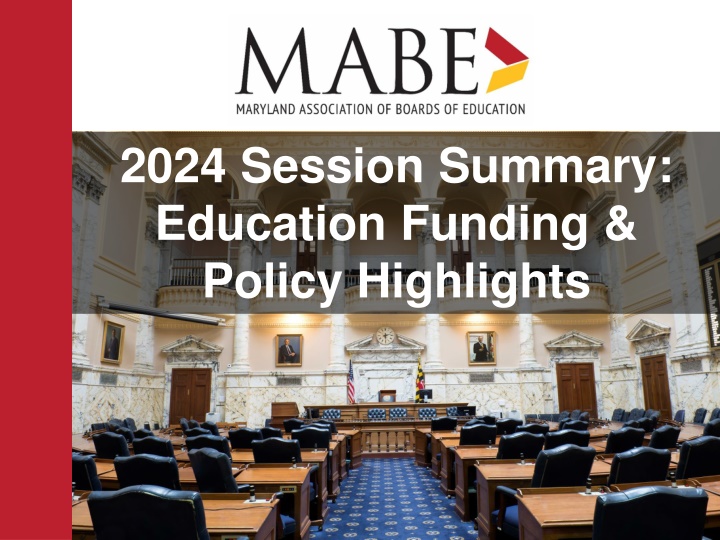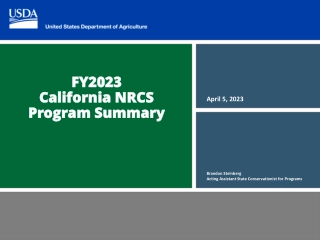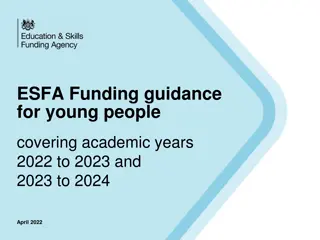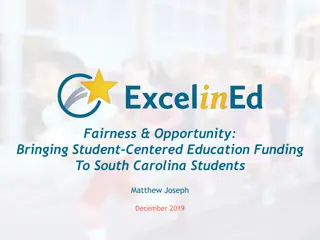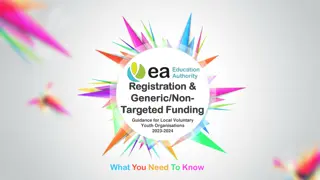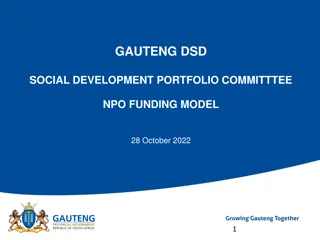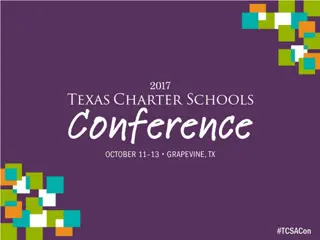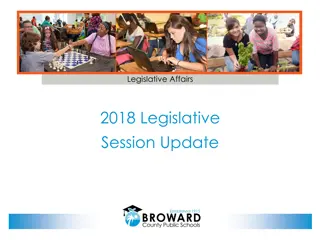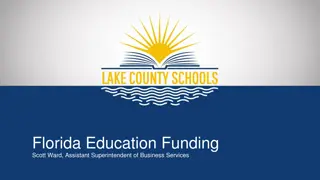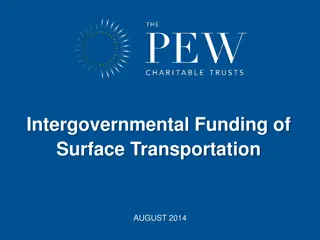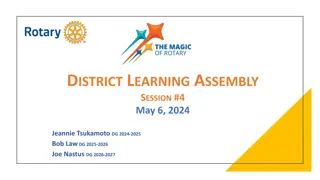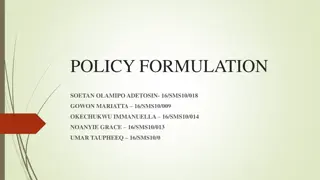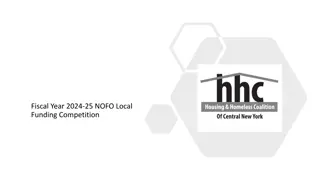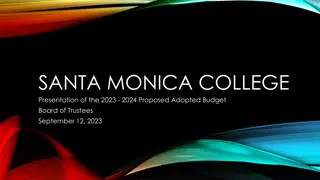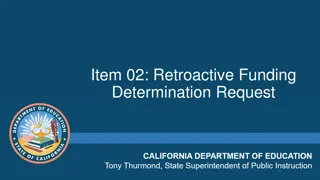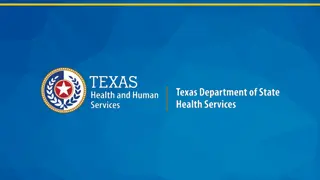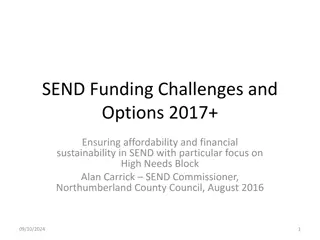2024 Session Summary: Education Funding & Policy Highlights
The 2024 legislative session overview includes education funding, policy highlights, MABE's mission, advocacy goals, and legislative priorities. It covers bills introduced, budgets, school construction, leadership training, and more. The Maryland Association of Boards of Education's stance on governance autonomy, funding for schools, and local investments is emphasized.
Download Presentation

Please find below an Image/Link to download the presentation.
The content on the website is provided AS IS for your information and personal use only. It may not be sold, licensed, or shared on other websites without obtaining consent from the author.If you encounter any issues during the download, it is possible that the publisher has removed the file from their server.
You are allowed to download the files provided on this website for personal or commercial use, subject to the condition that they are used lawfully. All files are the property of their respective owners.
The content on the website is provided AS IS for your information and personal use only. It may not be sold, licensed, or shared on other websites without obtaining consent from the author.
E N D
Presentation Transcript
2024 Session Summary: Education Funding & Policy Highlights
Presentation Overview Introduction MABE Priorities Education Budget School Construction Budget Blueprint Revisions PreK Community Schools Leadership Training Finance & Operations Employee Relations Student Health Food Services Curriculum & Instruction Special Education School Safety & Liability Juvenile Law Elections Local Bills Failed Bills of Note
MABEs Mission & Advocacy Goal Mission The mission of the Maryland Association of Boards of Education is to provide members with a strong collective voice, and to support local school board governance through professional development, advocacy and member services. Advocacy Goal We serve our members by being advocates for public schools, for local control of education, and for the leadership and legal authority of school boards.
2024 Session Overview The 2024 legislative session saw the introduction of 1,535 House bills and 1,193 Senate bills, including the State operating and capital budget bills. MABE monitored more than 400 of these bills, with many becoming new laws with significant impacts on public education funding and policy. MABE s bill testimony reflected MABE's Legislative Positions & Priorities, which include position statements on major policy areas. MABE legislative positions also reflect the association s Continuing Resolutions, which are updated and adopted by the full membership at MABE s annual conference.
MABEs Legislative Priorities in 2024 MABE s adopted legislative priorities for the 2024 legislative session: Support for continued governance autonomy for local boards of education to set education policy and school budgets; and opposition to unfunded mandates; Support for full State funding for the Blueprint and Maryland s outstanding public schools; Support for robust State funding for school construction and renovation projects; and Support for sustained and increased local government investments in education.
Education in the State Budget SB 360 - FY 2025 State Budget Bill SB 362 - FY 2025 Budget Reconciliation and Financing Act (BRFA) Increases Funding for Public Schools: State support for public schools will total $9.1 billion. Aid to local school systems will increase an estimated $457.1 million, or 5.3%. Improves the Financial Condition of the Blueprint Fund: The budget erases the projected FY 2027 Blueprint Fund shortfall by increasing taxes on cigarettes, other tobacco products, and electronic smoking devices and dedicating both the new revenues and a portion of existing tobacco tax revenues to the Blueprint Fund. Other actions improving the health of the Blueprint Fund include reducing FY 2025 spending and transferring $40 million from the School Construction Revolving Loan Fund. Preserves Reserves: About $2.4 billion in cash resources are preserved including $2.3 billion in the Revenue Stabilization Account (Rainy Day Fund) (9.4% of general fund revenues) and $128 million in the General Fund.
Education in the State Budget SB 360 - FY 2025 State Budget Bill SB 362 - FY 2025 Budget Reconciliation and Financing Act (BRFA) MABE advocated for the following provision of the BRFA, as introduced. It was removed in the Senate, reinstated in the House, and adopted by the Conference Committee. School-based Behavioral Health Highlight: For FY 2025 only, the Blueprint for Maryland s Future Fund provided for Coordinated Community Supports (the Consortium) may include reimbursements for school-based behavioral health services (not to exceed $12 million), and to reimburse the Medical Care Programs Administration for services provided on a fee-for-service basis through a Medicaid waiver. - Conference Committee Summary Report
Education in the State Budget Supplemental Budget Impacts on Education Funding (State and Local Share) Governor Moore s Supplemental Budget No. 2 includes several increases and decreases in State education aid, with impacts on not only the State but also local share of funding for certain categories of Blueprint funding. Examples: State Share of Foundation: Compensatory Education: Prekindergarten: Students with Disabilities: CTE Concentration of Poverty -$862,640 (reduction) $644,367 $9,440,174 -$901,267 (reduction) $4,326,467 $4,906,361 Link to Supplemental Budget No. 2 (March 26, 2024): https://dls.maryland.gov/pubs/prod/OperBgt/Fiscal_2025_ Supplemental_Budget_No_2.pdf
School Construction in the Capital Budget SB 361 - FY 2025 Capital Budget Bill School Construction Program Funding Aging Schools Program FY 2025 $6.1 million Health School Facility Fund $90 million School Construction Program $314 million Supplemental Grant Program $40 million Total $450 million
Blueprint HB 1082 - Blueprint for Maryland s Future Implementation Funding and Independent Evaluation Alterations Requires each county board of education to provide $150,000 for the salary and benefits of the Blueprint implementation coordinator. The State and county governments must pay for coordinator salaries in the same proportion as the foundation program. Local boards of education receive $3.6 million in additional annual State and local funding for local Blueprint coordinator salaries ($1.84 million in State funding and $1.76 million in local funding). The requirement to appoint an implementation coordinator for each county, which currently terminates after FY 2026, is extended indefinitely. The bill takes effect July 1, 2024.
Blueprint HB 1426 - Education Blueprint for Maryland s Future Alterations Authorizing the State Board and the AIB to establish limits on courses taken by dually enrolled students. Authorizing the State Board, rather than AIB, to determine criterial for classroom teaching time. Extending the date for the external report on Blueprint implementation. Other deadline extensions and misc. provisions.
Prekindergarten HB 902 - Prekindergarten - Ulysses Currie Head Start Program - Eligibility for State Funds Establishes that a provider in the Ulysses Currie Head Start Program is eligible to receive full State funds under the full- day prekindergarten program, even if the program receives federal funds. Providers may be exempted from including specified structural elements that are evidence-based and nationally recognized as important for ensuring program quality, in order to qualify for full-day prekindergarten funding. This bill will presumably impact both state and local shares of prekindergarten funding for additional Head Start students beginning in FY 2026. The bill takes effect July 1, 2024.
Prekindergarten HB 1441 - Early Childhood Education - Publicly Funded Prekindergarten Programs - Alterations Makes numerous changes related to publicly funded prekindergarten programs, including adjusting staff credentials, altering slot allocations for providers, requiring agreements between local boards and relevant agencies, authorizing applications for State funding for leased space, introducing support initiatives, establishing a career ladder for private prekindergarten providers, establishing provider hubs, and extending funding timelines for grant programs. Highlight: Extends PreK Expansion Grant funding, at nearly $20,000 per pupil, through FY 2030 to incentivize private participation. Beginning in the 2024-2025 school year, private PreK slots shall account for at least 10% of the total by county; increasing by 10% per year until 2028-2029 (when private slots must account for 50%). The bill takes effect July 1, 2024.
Community Schools HB 200/SB 161 Community Schools - Alterations Alters requirements for community schools and community school coordinators, including: Requires MSDE (Comm. Schools Dir.) to create common needs assessment and evaluation form. Requires coordinators to submit detailed annual reports to MSDE and the AIB on funding and strategies. State then publishes these reports and statewide report. Note: The bill was amended to NOT provide school system flexibility on a portion of school-based funding.
Community Schools HB 428/SB 370 - Community Schools - Rental Assistance for Community School Families Program and Fund Establishment Establishes the Rental Assistance for Community School Families Program and related fund to provide rental assistance to eligible student households at community schools. The Department of Housing and Community Development (DHCD) must administer the program in consultation with the Maryland State Department of Education (MSDE). The Governor may include an appropriation of $10 million in the annual budget bill for the program. Per MABE s request, the bill was amended to remove the mandated role of community school coordinators. The bill takes effect July 1, 2024.
Community Schools SB 482 - Governor's Office for Children - Engaging Neighborhoods, Organizations, Unions, Governments, and Households (ENOUGH) Grant Program (ENOUGH Act of 2024) This Administration bill codifies the Governor s Office for Children (GOC) and establishes the ENOUGH Grant Program and Fund ($15 million) to advance place-based strategies targeting child poverty. Grants must serve a community that includes census tracts with more than 20% of children living in poverty; and represent a partnership that includes at least one community-based organization, one public school, and one local governmental entity and has identified a lead partner and a fiscal agent. Grants are to increase community health and safety, job training and placement, access to high-quality education and health care, and leverage federal, local, and private funding. ENOUGH Program community needs assessments are to supplement and not conflict with the community school needs assessment. The bill takes effect July 1, 2022.
Career & Technical Education SB 33 - More Opportunities for Career Focused Students Act of 2024 Requires public high schools, in the same manner in which the school informs students of postsecondary educational options (Naviance), to inform students of employment and skills training opportunities available through: (1) apprenticeship sponsors registered with the division of workforce development and adult learning; (2) employers registered with the Maryland Dept. of Labor or local workforce development boards; and (3) schools licensed by MHEC that provide training, retraining, or enhancement in employment skills. The bill takes effect July 1, 2024.
Career & Technical Education HB 1492/SB 1042 - Education - Armed Services Vocational Aptitude Battery - Student Information Alters the requirement that each public school that administers the Armed Services Vocational Aptitude Battery (ASVAB) select Option 8 as the score reporting requirement to prohibit the general release of student information to military recruiters, and instead requires local school systems to notify students (and their parents or guardians) two weeks before administering the ASVAB of the option to withhold the release of a student s personal information and ASVAB test scores to military recruiters. The bill takes effect July 1, 2024.
Leadership Training HB 1287 - School Leadership Training Program - Alterations Consolidates and modifies the Blueprint law s required school leadership training programs, already required to be established by MSDE in conjunction with the AIB. Requires the State Superintendent of Schools, local superintendents of schools, the chairs and vice-chairs of the State Board, AIB, and each local board to complete the training but only at least once. Encourages, to the extent practicable, training of all members of local boards, the State Board and AIB, principals, and senior leadership staff. Training is to be cohort based to encourage collaboration and shared learning, provided through virtual sessions and in-person sessions, including through regional gatherings of education leaders and other meetings. The bill takes effect June 1, 2024. Specific training topics are outlined on the following slides.
Leadership Training HB 1287 - School Leadership Training Program - Alterations The school leadership training program shall include: a review of education in the United States relative to countries with top performing education systems and the implications of high performance for students, the economic security of the United States, and quality of life; a model for strategic thinking that will assist education leaders to transform districts and redesign schools under their leadership; overview of ethical leadership directly tied to the educational leaders responsibility to drive equitable learning in their schools; lessons in transformational leadership; research-based model for coaching school leaders and instructional coaches; training to provide a working knowledge of research on how students learn and its implications; training to provide a deep understanding of standards-aligned instructional systems;
Leadership Training HB 1287 - School Leadership Training Program - Alterations a method for organizing schools to achieve high performance, including (1) building instructional leadership teams; (2) implementing career ladders for teachers; (3) overseeing teacher induction and mentoring systems; and (4) identifying recruiting and retaining high quality and diverse school leaders; and review of research regarding (1) the benefits to students from access to high-quality and diverse teachers; (2) methods to attract highly qualified teachers from diverse backgrounds who reflect the demographics of the students they teach; and (3) best practices for teacher retention, including retention of teachers from diverse backgrounds.
School Finance and Business Operations HB 291/SB 170 - County Boards of Education - Bid Advertisement Threshold and Electronic Posting of Hearing Notices and Bid Advertisements Requires county boards of education to electronically post hearing information pertaining to the selection of a school site on the local school system website, in addition to in a newspaper of general circulation in the county. Repeals a physical posting requirement and specifies county boards of education can post notice on local school system websites to fulfill the notice requirements for bids on school buildings, improvements, supplies, or equipment above a certain value. Makes a technical change to specify that reporting requirements apply to items valued at more than $100,000. Updates public notification requirements by specifying eMaryland Marketplace, instead of Maryland Contract Weekly, as an authorized publication. The bill takes effect July 1, 2024.
School Finance and Business Operations HB 571/SB 485 - Family and Medical Leave Insurance Program Modifications Modifies the Family and Medical Leave Insurance (FAMLI) Program by altering key administrative deadlines, definitions, and components of the program s administration. The program start dates are delayed by nine months to July 1, 2025, for required contributions and six months to July 1, 2026, for benefit payments. The bill also authorizes the Maryland Department of Labor (MDL) to adopt regulations that establish application and renewal fees for private employer plans.
School Finance and Business Operations HB 760 - Office of Legislative Audits - Local School Systems - Report Requires each local school system to submit a report to the Joint Audit and Evaluation Committee on the status of the implementation of corrective actions to address repeat findings and recommendations identified by the Office of Legislative Audits (OLA) in the most recent six-year audit. This report is due by November 1 of the third year of a six- year audit cycle. Each local school system must publish the report on its website with any cybersecurity findings redacted in a manner consistent with auditing best practices. The bill takes effect July 1, 2024.
School Finance and Business Operations HB 1115/SB 1026 - County Boards of Education Budgets Notice (Transparency in Education Spending Act) Requires the State Board of Education to adopt a process for the uniform reporting of information in a county board of education budget to timely share the information provided by a county board of education in that budget to a county governing body. County boards must prepare their annual budget to include as major categories (1) specified current funds held in reserve; (2) the amount of any federal funds received in the last fiscal year; and (3) the amount of funds held in trust or otherwise dedicated toward long- term obligations for retiree health care costs or other postemployment benefits, and information used to calculate the county board s obligation for those costs. The bill takes effect July 1, 2024. Note: The bill does NOT modify the law regarding fund transfers.
School Facilities HB 1390 - Public Schools - Public School Construction - Funding and Administration Repeals the scheduled termination of the School Safety Grant Program (SSGP) on June 30, 2026; Reduces the mandated appropriation for the Nancy K. Kopp Public School Facilities Priority Fund (PSFPF) by $10 million annually beginning in fiscal 2027; Alters the purpose of PSFPF only for fiscal 2027; Requires the State to begin making payments to Prince George s County for a public-private partnership (P3) in fiscal 2025 (instead of fiscal 2026); and Clarifies legislative intent regarding $450 million annual CIP funding levels for school construction is in addition to Built to Learn funding. The bill takes effect June 1, 2024. Note: the bill does NOT repeal the sunset for the $6 million Aging Schools Program in FY 2026.
Employee Relations HB 137 - Civil Actions - Civil Immunity - Educator Intervention Establishes that a member of the administrative, educational, or support staff of any public, private, or parochial school acting in an official capacity is immune from civil liability for any personal injury or property damage resulting from an intervention in an altercation between students or other student disturbance if: (1) the member intervened in a reasonably prudent manner and (2) the member s actions do not constitute grossly negligent, willful, wanton, or intentionally tortious conduct. The bill takes effect October 1, 2024.
Employee Relations HB 144/SB 232 - Public Employee Relations Act Alterations This departmental bill alters provisions of the Public Employee Relations Act (PERA) by defining the term interested employee organization as an employee organization already representing employees in a bargaining unit or a petitioner who has met the showing of interest requirement under current law. The bill alters the timing of exclusive representative access to new employees under PERA. Additionally, the bill clarifies responsibilities of specified deputy directors and the process for investigations under PERA. The bill takes effect July 1, 2024.
Employee Relations HB 945/SB 771 - Education - Initial Teacher Certification - Requirements Repeals the graduation requirement, set to take effect in 2025, that graduates of teacher preparation programs must also pass a nationally- recognized portfolio-based assessment ( 6 121); . Modifies initial teacher certification requirements to require a candidate to: Pass the subject-specific examinations under current law ( 6 125); and Meet one of the following qualifications: (1) pass a nationally recognized, portfolio-based assessment of teaching ability (current law); or (2) complete a rigorous local school system teacher induction program. The bill takes effect July 1, 2024. Details on the local induction programs are described on the following slide.
Employee Relations HB 945/SB 771 - Education - Initial Teacher Certification - Requirements A rigorous local school system teacher induction program must last for the lesser of 3 years or the amount of time a teacher may hold a conditional teacher certificate, and teachers must: 1. pass a basic literacy skills assessment approved by the department; 2. hold a degree from a regionally accredited educational institution and have earned a minimum overall cumulative grade point average of 3.0 on a 4.0 scale or its equivalent on the most recently earned degree; or 3. submit documentation satisfactory to the department of satisfactory having received effective evaluations from a local school system. Plans for local induction programs must be submitted to MSDE and AIB.
Employee Relations HB 1157/SB 937 - Grow Your Own Educators Grant Program - Established Establishes the Grow Your Own Educators Grant Program to provide support to eligible provisional teachers and noncertified education support professionals interested in teaching who pledge to fulfill a service obligation. Provides grants to local school systems in collaboratives for certain teacher candidates expenses and program administration costs. Collaboratives (consisting of local school systems, employee organizations representing those employees, and approved teacher preparation programs) may apply for grants by submitting plans to MSDE. The Governor may include in the annual budget bill an appropriation for the program. The bill takes effect July 1, 2024.
Employee Relations HB 1386 - Education - School Employee Antibias Training - Requirements Requires MSDE, in consultation with the Professional Standards and Teacher Education Board (PSTEB), to develop guidelines for an antibias training program for school employees. Requires each county board of education to provide anti-bias training every other year to all employees whose job duties include frequent interaction with students. Requires training to be job-embedded, paid professional development provided during non-teaching time. To the extent practicable, training is to be offered in a peer-to-peer setting; take a half day or less, and incorporate lessons from local incidents of bullying, harassment or intimidation. The bill takes effect July 1, 2024.
Higher Education HB 75/SB 377 - Higher Education - Teacher Development and Retention Program - Alterations Expands eligibility for Teacher Development and Retention Program educator stipends (a program to provide both initial stipends and internship stipends) to include students attending a Maryland community college. Extends the initial stipend and internship stipend programs to 2030. The bill takes effect July 1, 2024. Background: The Teacher Development and Retention Program is a pilot program designed to incentivize a cohort of students to pursue a career in the teaching profession. The purpose of the Program is to provide support to eligible individuals who ultimately pledge to fulfill a service obligation as a teacher employed full time in a high needs school, grade level, or content area in the State in which there is a shortage of teachers, as identified by the Department.
Higher Education HB 545/SB 441 - Janet L. Hoffman Loan Assistance Repayment Program - Nancy Grasmick Public School Professional Award - Public School Nurses This bill expands eligibility for the Nancy Grasmick Public School Professional Award to include public school nurses with two years of experience who provide health services in a public school and are employed by a local school system or local health department (LHD) to provide health services through an agreement with a local board of education. The bill also expands the requirements of the Maryland Higher Education Commission (MHEC) to publicize the program to include doing so to eligible public school nurses in an effort to recruit and retain nurses working in public schools in the State. The bill takes effect July 1, 2024.
Student Health HB 86/SB 180 - Public and Nonpublic Schools - Bronchodilators - Use, Availability, Training, and Policies This bill requires the Maryland Department of Health (MDH), in consultation with local boards of education, to establish a policy for public schools to authorize the school nurse and designated school personnel to administer a bronchodilator to a student who is determined (by an individual with specified training) to be, or is perceived to be, experiencing asthma- related symptoms or is perceived to be in respiratory distress. A bronchodilator may be administered to such a student regardless of whether the student has been diagnosed with asthma or reactive airway disease or has been prescribed a bronchodilator by a licensed health care practitioner. The bill takes effect July 1, 2024.
Student Health HB 204/SB 165 - Education Coaches Mental Health Training Requires each public school in the State that offers an athletic program and each public institution of higher education that offers an athletic program to provide specified mental health training to each participating coach. Requires MSDE, MDH, each local board of education, and the Maryland Public Secondary Schools Athletic Association (MPSSAA) to develop guidelines for public schools to train coaches in recognizing the indicators of mental illness and behavioral distress in students (including depression, trauma, violence, youth suicide, and substance abuse). MHEC must work with MDH to develop guidelines for public institutions of higher education to train coaches in recognizing the indicators of mental illness and behavioral distress in students. The bill takes effect July 1, 2024.
Student Health HB 522 - Public Schools - Student Telehealth Appointments - Policy and Access Requires MSDE and MDH to jointly to adopt State guidelines by Dec. 31, 2024 for school health services regarding student access to telehealth appointments during the school day in public middle and high schools. Requires each local board of education to establish a policy before the start of the 2025-2026 school year to accommodate students who need to participate in telehealth appointments scheduled during the school day. On request, MSDE must provide technical assistance to local boards to establish telehealth policies. The bill takes effect July 1, 2024.
Student Health HB 1219 - Public and Nonpublic Middle and High Schools - Venue- Specific Emergency Action Plans for Athletic Facilities (The Bailey Bullock Act) Requires each public middle and high school to include a cardiac emergency response plan (CERP) as a component of its venue-specific emergency action plan for athletic facilities. Requires all nonpublic middle and high schools receiving State funding to develop a venue-specific emergency action plan for athletic facilities, including a CERP, identical to the emergency action plans required of public middle and high schools. For both public and nonpublic schools, the CERP must (1) identify the appropriate school personnel as the cardiac emergency response team to respond to incidents involving sudden cardiac arrest or a similar life- threatening emergency while at an athletic facility; (2) coordinate with first responders in the local emergency medical services (EMS) to integrate the plan into local emergency response protocols; (3) include specified evidence-based core elements recommended by an appropriate national organization; and (4) be annually reviewed and updated by each middle school and high school. The bill takes effect July 1, 2024.
Student Health SB 1099 - Emergency Services - Automated External Defibrillator and Naloxone Co-Location Initiative - Requirements for Public Buildings Expands the purpose of the Public Access Automated External Defibrillator Program (AED program) to include an initiative to co- locate up to two doses of naloxone with each automated external defibrillator (AED) placed in a public building, including public high schools. The Emergency Medical Services (EMS) Board must (1) develop and implement the initiative in collaboration with the Maryland Department of Health (MDH) and (2) adopt regulations jointly with MDH. The initiative must be funded using available funds from the Opioid Restitution Fund (ORF). This bill takes effect October 1, 2024.
School Meals HB 386/SB 425 - Maryland Meals for Achievement In-Classroom Breakfast Program - Alterations (Maryland Meals for Achievement Flexibility Act of 2024) Authorizes elementary schools participating in the Maryland Meals for Achievement (MMFA) program to serve breakfast in any broadly accessible part of the school, including from Grab and Go carts after the arrival of students to the school, provided that students are allowed to consume the meal in the classroom after the start of the school day. Requires approval from MSDE and the local board of education. Clarifies that secondary schools that serve breakfast, including from Grab and Go carts after the arrival of students to the school, must serve these breakfasts in any broadly accessible part of the school. The bill takes effect July 1, 2024.
School Meals SB 579 - Primary and Secondary Education - Breakfast and Lunch Programs - Universal Expansion Report Requires the MSDE to report to the General Assembly on the cost to provide free breakfast and lunch to all students in public schools in the State by December 1, 2024. The bill takes effect July 1, 2024, and terminates June 30, 2025. Note: Legislation to mandate state funding for universal free school breakfasts and lunches was estimated to cost in excess of $90 million (SB 557, 2023).
Curriculum & Instruction HB 475 - Education - Open-Source Phonics Matching Grant Program - Establishment (Open-Source Phonics Matching Grant Program Act) Establishes the Open-Source Phonics Matching Grant Program within MSDE to provide matching funds to open-source phonics organizations to provide free, open-source phonics learning materials to be used by adults to tutor students in the State. MSDE must (1) distribute grants to open-source phonics organizations and (2) by December 1, 2025, and every other year thereafter, collect statistics and other information and report to the General Assembly on the effectiveness of the program. For each fiscal year, the Governor must include in the annual budget bill an appropriation of $150,000 to the program. The bill takes effect October 1, 2024.
Curriculum & Instruction HB 785/SB 738 - Freedom to Read Act This emergency bill establishes a State policy that local school systems operate school library media programs consistent with specified standards. Each local school system is required to develop and implement a policy and procedures to review objections to materials in the school library media program, subject to certain requirements. A county board of education is prohibited from taking retaliatory actions against certain school library media program personnel for performing their job duties consistent with the standards. The bill similarly establishes that it is the policy of the State that each library must operate in a manner consistent with the specified standards. Emergency bill taking effect upon the Governor s signature.
Driver Education & Field Trips HB 1482 Uninsured Driving Penalties - Funding for the Maryland Automobile Insurance Fund, Driver Education, and Transportation to Field Trips Establishes the Driver Education in Public Schools Grant Program ($2 million) to provide grants to public schools and nonprofit organizations to assist public schools in offering driver education courses to students. Likewise, the bill establishes the State-Aided Institutions Field Trip Grant Program ($600,000) to assist public schools in transporting students to field trips at State-aided educational institutions. MSDE is to prioritize public schools at which at least 40% of the registered students are eligible for the federal free or reduced-price meals. The bill takes effect July 1, 2024.
Special Education HB 336/SB 592 - Maryland Achieving a Better Life Experience (ABLE) Program - Materials for Individualized Education Program, Individualized Family Service Plan, and 504 Plan Meetings Requires the State Treasurer to develop written informational materials about the Maryland Achieving a Better Life Experience (ABLE), which must be distributable electronically or by hand, and provide those materials to the State Board of Education and local boards of education for distribution to parents during individualized education program (IEP), individualized family service plan (IFSP), or 504 plan meetings as specified. The bill takes effect July 1, 2024.
Special Education HB 903/SB 797 - Education Access to Attorneys, Advocates, and Consultants for Special Education Program and Fund Established Establishes the Access to Attorneys, Advocates, and Consultants for Special Education (AAACSE) Program and Fund administered by the Maryland Volunteer Lawyers Service (MVLS). The AAACSE Program directs resources and services to eligible students to provide access to legal, advocacy, and consultant services. Eligible students are those with a disability whose parent (1) has a household income not more than 150% of the Maryland Legal Services Corporation (MLSC) income guidelines and (2) made at least one attempt to resolve a disagreement with a public agency regarding the child s special education services or program. Beginning in FY 2026, the Governor must include $1 million to the AAACSE Fund in the annual budget bill. Training for advocates and consultants to be developed in consultation with the MSDE, local school system special education directors, disability rights advocates, and representatives from the judiciary. The bill takes effect July 1, 2024.
Special Education HB 1076/SB 1091 - Education - Blind and Visually Impaired Students - Textbook Equity Requires, by January 1, 2025, local boards of education to require publishers that sell pupil edition textbooks to provide an electronic file of the textbook in a specified standard to the National Instructional Materials Access Center (NIMAC) when the publisher provides the textbook. MSDE, NIMAC, and local boards must enter into a memorandum of understanding (MOU) to accomplish these purposes. Local boards must, by March 15 of each year, determine the instructional materials that will be used in the upcoming school year by students with individualized education programs (IEPs) and 504 plans under the federal Rehabilitation Act of 1973. A local board must coordinate with the Instructional Resources Center (IRC) to provide the instructional materials in a specialized format to students who are blind or visually impaired, no later than the first day of classes of the upcoming school year. The bill takes effect July 1, 2024.
School Safety HB 416 - Public Schools - Active Shooter Safety Drills or Trainings Requirements Prohibits active shooter drills or trainings in schools from including specified activities that may be traumatic for students or school personnel. Requires local school systems to (1) notify parents in advance of active shooter drills or trainings in schools; (2) provide mental health follow-up to students and school personnel after an active shooter drill or training; and (3) collect data on the effectiveness and psychological impact of the drills or trainings and report the data to the Maryland Center for School Safety (MCSS) for further analysis. Requires MCSS to develop and distribute model content regarding the State s firearm storage laws, as specified. The bill takes effect July 1, 2024.
School Safety HB 472/SB 540 - Education - School Mapping Data Program Established This bill creates the School Mapping Data Program in the Maryland Center for School Safety (MCSS) to provide funds to local school systems to produce school mapping data for each public school in the county, including charter schools. The Interagency Commission on School Construction (IAC) must adopt facility mapping standards for the uniform mapping of the physical attributes of public schools. The bill authorizes the School Safety Subcabinet to use funds in the Safe Schools Fund to make grants to local school systems under the program. The bill takes effect July 1, 2024.
School Safety HB 1167 - Maryland Center for School Safety - Secure Schools Emergency Response Grant Program Established Establishes the Secure Schools Emergency Response Grant Program in the Maryland Center for School Safety (MCSS). The purpose of the program is to provide grants to local school systems to improve emergency notification systems and communication between public elementary and secondary school personnel, a public safety answering point (PSAP), and a public safety agency during emergency events. Local school systems that apply for and receive grants must use the funds to improve emergency notification systems or enhance communications within the school and with public safety agencies. By September 1, 2026, MCSS must ensure that the program is operating and available to each local school board. The Governor may include an appropriation in the annual budget bill for the program. The bill takes effect July 1, 2024.
